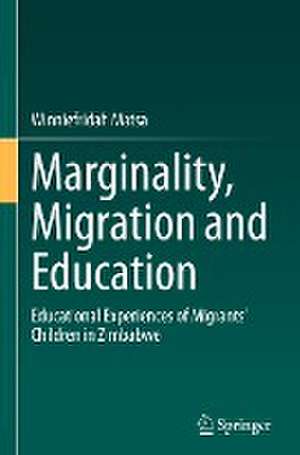Marginality, Migration and Education: Educational Experiences of Migrants’ Children in Zimbabwe
Autor Winniefridah Matsaen Limba Engleză Hardback – 22 dec 2020
| Toate formatele și edițiile | Preț | Express |
|---|---|---|
| Paperback (1) | 467.57 lei 39-44 zile | |
| Springer International Publishing – 23 dec 2021 | 467.57 lei 39-44 zile | |
| Hardback (1) | 474.83 lei 39-44 zile | |
| Springer International Publishing – 22 dec 2020 | 474.83 lei 39-44 zile |
Preț: 474.83 lei
Preț vechi: 593.53 lei
-20% Nou
Puncte Express: 712
Preț estimativ în valută:
90.90€ • 94.49$ • 75.37£
90.90€ • 94.49$ • 75.37£
Carte tipărită la comandă
Livrare economică 03-08 februarie 25
Preluare comenzi: 021 569.72.76
Specificații
ISBN-13: 9783030608729
ISBN-10: 3030608727
Pagini: 134
Ilustrații: XI, 134 p. 4 illus.
Dimensiuni: 155 x 235 mm
Greutate: 0.32 kg
Ediția:1st ed. 2020
Editura: Springer International Publishing
Colecția Springer
Locul publicării:Cham, Switzerland
ISBN-10: 3030608727
Pagini: 134
Ilustrații: XI, 134 p. 4 illus.
Dimensiuni: 155 x 235 mm
Greutate: 0.32 kg
Ediția:1st ed. 2020
Editura: Springer International Publishing
Colecția Springer
Locul publicării:Cham, Switzerland
Cuprins
Chapter 1: Background to the nature of international migration in the african continent and zimbabwe.- Chapter 2: Geo-physical and the socio-economic learning environments for migrants’children: converging experiences of migration and marginality on the education of boys and girls in bulilima and mangwe.- Chapter 3: Gender and the nature of migration: absence of one or both parents.- Chapter 4: Effects of migration elsewhere and zimbabwe.- Chapter 5: Educational challenges of migrants’ children at home and school: teachers, leaners and caregivers’ perspectives.- Chapter 6: Low cost” boarding and “child renters”: boys and girls schooling in risky physical and social environments in bulilima and mangwe.- Chapter 7: Children belonging to “no one”: learners trapped in strained and suspicious relationships.- Chapter 8: The impact of migration on the family and childrens’ rights: gendered perspective.- Chapter 9: “Silent wars” between migrants’ children and teachers, teachers and migrant parents: gendered ‘war’.- Chapter 10: Intervention strategies for equity in education: syncronised and co-ordinated model to help learners cope with absence of parents due to migration in zimbabwe.- Chapter 11: Implications of the book.
Notă biografică
Dr. Winniefridah Matsa is a Senior Lecturer at Midlands State University, Zimbabwe. Her research interests include aspects of gender and migration as they pertain to culture, environment, education, women, and sociological issues.
Textul de pe ultima copertă
This book provides a missing link between marginality, migration and education in Zimbabwe, focusing on the educational experiences of migrants’ children in an effort to influence government policies concerning migrant parents and their left-behind children. While there is a large body of knowledge on the education of children of immigrants in destination countries, this book aims to fill in the gap by addressing the children who do not migrate with their parents. Through this unique approach, the book examines the education statuses of these left-behind children, offering insights into their educational challenges, rights, and inequities to better inform policy decisions to meet the 2030 education agenda for action established by the United Nations in 2015. The book will of interest and use to governments, NGOs, teachers and local communities in Africa as a resource to better understand the situation of migrants’ left-behind children as a category ofvulnerable children in difficult circumstances.
Caracteristici
Provides a missing link between marginality, migration and education in Zimbabwe Aimed at governments, NGOs, teachers and local communities to help understand the situation of migrants’ children as a category of vulnerable children in difficult circumstances Focuses on educational experiences of migrants’ children to influence government policies concerning migrant parents and their left-behind children
